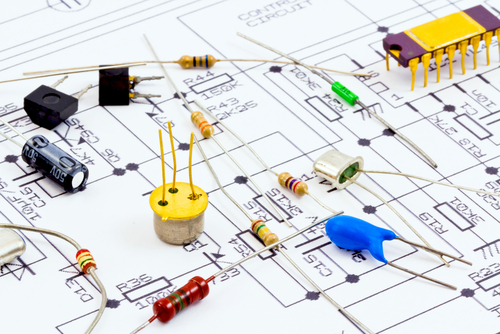How to Choose the Right Passive Components Electronics Distributor?
In the rapidly evolving world of electronics, passive components play a crucial role in the functioning of nearly every electronic device. These components, which include resistors, capacitors, inductors, and more, are essential in controlling and stabilizing the flow of electricity within a circuit. Whether you're an electronics manufacturer or an engineer working on a new project, selecting the right passive components distributor is paramount to the success of your product. The distributor you choose can impact the quality, availability, and cost of the components you rely on, making this decision a critical one.
In this comprehensive guide, we will explore the key factors to consider when selecting a distributor for passive components electronics, ensuring you make the best choice for your needs.

1. Define Your Objectives
When searching for a passive components distributor, the first step is to clearly define your objectives. The market is filled with a variety of distributors, each catering to different customer bases and specializing in different types of components. Understanding your specific requirements will help you narrow down your options and choose a distributor that aligns with your needs.
Types of Distributors:
Regional Distributors: These distributors primarily serve local markets and may offer more personalized service. They often have a deep understanding of regional market dynamics and can provide tailored solutions.Global Online Distributors: These distributors offer a vast selection of components to customers worldwide, often with the convenience of online ordering and global shipping. They are ideal for businesses looking for a wide range of components and fast access to international markets.Specialized Distributors: Some distributors focus on specific industries or types of components. If your project requires specialized components, such as those used in automotive applications, a specialized distributor may be the best choice.
Considerations:
Target Market: Determine whether your needs align more closely with local expertise or global reach.Component Specialization: Assess whether you need a distributor with a broad selection of general components or one that specializes in niche markets.
By defining your objectives early in the process, you can more easily identify which type of distributor will best meet your needs.
2. Evaluate Inventory Availability
In the fast-paced electronics industry, time is of the essence. The ability to quickly source the necessary components can be the difference between meeting production deadlines and facing costly delays. This is why the availability of inventory is a critical factor when choosing a passive components distributor.
Key Points:
Large Inventory: Opt for distributors that maintain a large and diverse inventory. This ensures that you have access to the components you need, even when demand spikes or when you're working with older product designs that may require hard-to-find parts.
Stock Levels: Ensure that the distributor has adequate stock levels for the components you regularly use. This is particularly important for high-volume production runs where large quantities of components are needed on short notice.
Alternative Components: A well-stocked distributor will also offer alternative components that can serve as substitutes in case of shortages or discontinuations. This flexibility can help you avoid production delays.Imagine you're working on a project that requires a specific type of resistor. Your chosen distributor has a large inventory and can provide the exact component you need. Additionally, they offer an alternative resistor with similar specifications, ensuring that your production can continue smoothly even if your first choice is temporarily unavailable.
By partnering with a distributor that has a robust inventory, you can maintain the agility needed to respond to market changes and production demands.
3. Comprehensive Product Specifications
When it comes to purchasing passive components electronics, the ability to access and understand comprehensive product specifications is vital. Different projects and applications may require specific component characteristics, and having detailed information at your fingertips allows you to make informed purchasing decisions.
Considerations:
Range of Specifications: A good distributor will offer a wide range of product specifications, allowing you to select components that precisely meet your requirements. This includes details on resistance, capacitance, inductance, tolerance, temperature coefficient, and more.
Up-to-Date Products: Technology is constantly evolving, and so are the components used in electronics manufacturing. Choose a distributor that stays on top of these changes by regularly updating their product offerings with the latest components from leading manufacturers.
Compatibility and Standards: Ensure that the distributor provides components that comply with industry standards and are compatible with your existing designs. This is particularly important for applications requiring specific certifications or regulatory approvals.
Suppose you're designing a circuit that requires capacitors with a very low equivalent series resistance (ESR) to minimize power loss. A distributor that provides detailed specifications, including ESR values for their capacitors, will enable you to select the best component for your design, ensuring optimal performance.
By selecting a distributor that offers comprehensive product specifications, you can ensure that the components you purchase will meet the exact requirements of your projects.
4. Assess the Distributor's Quality Control
Quality is paramount when it comes to electronic components, as the reliability and performance of your final product depend on the quality of the components used. Therefore, it's essential to choose a distributor that adheres to strict quality control standards.
Quality Control Measures:
Supplier Certifications: Verify that the distributor only sources components from manufacturers with recognized certifications, such as ISO 9001. This ensures that the components are produced under stringent quality management systems.
In-House Testing: Some distributors conduct their own in-house testing to verify the quality of the components they sell. This can include electrical testing, environmental testing, and mechanical inspections.Traceability: Ensure that the distributor offers full traceability for the components they supply. This means you can trace each component back to its manufacturer and production batch, which is crucial for quality assurance and addressing any potential recalls.
You're sourcing inductors for a high-frequency application where performance is critical. A distributor that conducts in-house testing can provide assurance that the inductors meet your exact specifications and will perform reliably in your application.
By choosing a distributor with robust quality control practices, you can minimize the risk of component failures and ensure the long-term reliability of your products.
5. Consider the Distributor's Support and Services
Beyond providing high-quality components, a good distributor should also offer strong customer support and additional services that add value to your purchasing experience. These services can be particularly important if you encounter issues or need technical assistance during the design or production phases.
Support and Services:
Technical Support: Look for distributors that offer access to knowledgeable technical support teams. They can provide guidance on component selection, answer technical questions, and help troubleshoot any issues that arise.After-Sales Service: A distributor with excellent after-sales service can assist with returns, replacements, and warranty claims, ensuring that you receive the best possible service throughout the product lifecycle.
Logistics and Delivery: Efficient logistics and reliable delivery services are crucial, especially if you're working on tight production schedules. Choose a distributor known for timely deliveries and transparent shipping processes.Suppose you're working on a complex project and need advice on selecting the right passive components electronics for your design. A distributor with a dedicated technical support team can help you make the right choices, ensuring that your project stays on track and meets its performance goals.
By choosing a distributor that offers comprehensive support and services, you can enhance your overall experience and reduce the risks associated with component procurement.
Conclusion: Partnering with the Right Distributor
Selecting the right passive components distributor is a critical decision that can significantly impact your project's success. By defining your objectives, evaluating inventory availability, ensuring comprehensive product specifications, assessing quality control practices, and considering the distributor's support and services, you can make an informed choice that aligns with your needs.
For companies looking for a reliable distributor, unikeyic Electronics is a trusted partner in the industry. With a vast selection of passive components, including resistors, capacitors, and inductors, Unikeyic Electronics offers high-quality products, expert technical support, and efficient logistics. Whether you're working on a large-scale production run or a specialized project, Unikeyic Electronics provides the resources and expertise needed to ensure your success.
Passive Devices/Passive Components Electronics FAQ
1. What are passive components in electronics?Passive components are electronic components that do not require an external power source to operate. They include resistors, capacitors, inductors, and transformers. These components control the flow of electricity in a circuit, but they do not generate or amplify signals.
2. How do I choose the right passive components for my project?Choosing the right passive components involves considering factors such as the required resistance, capacitance, inductance, tolerance, and power rating. It's also important to ensure compatibility with the rest of your circuit design and to select components from reputable manufacturers.
3. Why is it important to source passive components from a reputable distributor?Sourcing from a reputable distributor ensures that the components are genuine, of high quality, and meet industry standards. It also provides access to technical support and after-sales services, which can be crucial if you encounter issues during the design or production phases.
4. What are some common challenges in using passive components, and how can they be addressed?Common challenges include selecting components with the correct specifications, managing thermal performance, and ensuring reliability in harsh environments. These challenges can be addressed by working closely with a knowledgeable distributor who can provide technical guidance and recommend appropriate components.
5. Can passive components affect the performance of my circuit?Yes, the choice of passive components can significantly impact the performance of your circuit. For example, the tolerance and temperature coefficient of resistors can affect the accuracy and stability of your circuit, while the ESR (Equivalent Series Resistance) of capacitors can influence power efficiency and signal integrity.
Related active passive electronic components articles recommended
Crystal Oscillators Unveiled: Understanding Active, Passive Types, and Key AccessoriesTop 5 Active and Passive Components Every Electronics Engineer Should KnowHow is the active electronic component industry developing?What are the types of active electronic components?Active vs Passive Components in Electronics: Key Differences and Applications


















